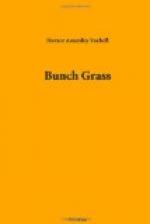We dined together, and I delivered the president’s message in Thorpe’s presence. He shook hands with Jim, and said quietly—
“I am happier to-night than I ever expected to be again.”
Bounder or not, he meant it.
Only the other day I received a letter from Angela. She wrote at length concerning her eldest child, my godson, and she mentioned incidentally that Jim was now cashier of the San Lorenzo Bank.
XV
MARY
His real name was Quong Wo, but my brother Ajax always called him Mary, because the boy’s round, childish face had a singular smoothness and delicacy. A good and faithful servant he proved during three years. Then he ran away at the time of the anti-Chinese riots, despite our assurance that we wished to keep him and protect him.
“Me no likee Coon Dogs,” said he, with a shiver.
The Coon Dogs were a pack of cowboys engaged in hunting Chinamen out of the peaceful, but sometimes ill-smelling, places which, by thrift, patience, and unremitting labour, they had made peculiarly their own. From the Coon Dogs Ajax and I received a letter commanding us to discharge Mary. A skull and cross-bones, and a motto, “Beware the bite of the Coon Dogs!” embellished this billet, which was written in red ink. Courtesy constrained us to acknowledge the receipt of it. Next day we put up a sign by the corral gate—
NO HUNTING ALLOWED ON THIS RANCH!
In the afternoon Mary disappeared.
Uncle Jake was of opinion that Mary had divined the meaning of our sign. He had said to Uncle Jake: “I go. Me makee heap trouble for boss.”
Later, upon the same day, we learned from a neighbour that the Coon Dogs had tarred and feathered one poor wretch; another had been stripped and whipped; a third was found half-strangled by his own queue; the market-gardens near San Lorenzo, miracles of industry, had been ravaged and destroyed. Before taking leave our neighbour mentioned the sign.
“Boys,” said he, “take that down—and ship Mary. I’m mighty glad,” he added reflectively, “that my ole woman does the cookin.”
“Mary skedaddled after dinner,” said Ajax, frowning, “but I’m going into town to-morrow to bring him back.”
However, Mary brought himself back that same night. We were smoking our second pipes after supper, when Ajax, pointing an expressive finger at the window, exclaimed sharply: “Great Scot! What’s that?”
Pressed against the pane, glaring in at us, was a face—a face so blanched and twisted by terror and pain that it seemed scarcely human. We hurried out. Mary staggered towards us. In his face were the cruel, venomous spines of the prickly pear. The tough boughs of the manzanita thickets through which he had plunged had scourged him like a cat-o’- nine tails. What clothes he wore were dripping with mud and slime.




